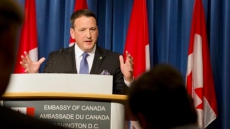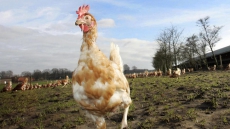VANCOUVER — Shaun Simpson has had a migraine headache for the past seven years.
His medical problems started with surgery to remove a piece of his skull that was pressing against his brain. The procedure left him with a spinal-fluid leak, which, in turn, fuels a near-constant headache.
For years, Simpson took a dozen or more Tylenol 3 pills a day, but they caused unpleasant side effects and weren't completely effective.
About two and a half years ago, he received a prescription for medical marijuana, which he ordered from Health Canada.
"I don't feel like I'm drugged out or stoned (like I did with) the Tylenol 3; I'm actually more active and social," says Simpson, 34, who works as a photographer in the Maritimes.
"It's really changed my life as far as day-to-day routine goes."
Simpson is among tens of thousands of Canadians who have used medical marijuana legally since 2001, and, like many of those patients, he was forced earlier this year to adjust to a massive overhaul of the system.
The federal government implemented new rules prohibiting patients from growing their own pot and instead restricting production and sale to a new collection of licensed commercial operations.
But the system has been beset by complaints of low supply and high prices. Some commercial producers have long waiting lists and are plagued by frequent sellouts, and approvals for new operations to fill the gap have been slow.
Simpson initially signed up for Toronto-based Mettrum, but he said the company was often sold out of the strain he needed. He is now on the waiting list for OrganiGram, based in Moncton, N.B., and in the meantime he's been using grey-market marijuana dispensaries.

Ottawa introduced the previous medical marijuana regime following a court decision in 2000 that ordered it to provide access to the drug.
About 38,000 patients received authorizations under that system, most of whom either chose to grow at home or asked someone else to grow it for them. Several thousand bought directly from Health Canada, which sold a single strain for $5 a gram.
The previous regime was repealed on March 31 of this year, leaving fledging commercial producers the only official option. However, a Federal Court judge issued an injunction that has allowed many patients to continue growing their own until a trial examining the updated rules in the new year.
There are currently 15 companies licensed to produce and sell medical marijuana; eight others are licensed to produce the drug but not to sell it.
Prospective suppliers must meet a list of strict conditions, including rigorous security requirements and measures to control odours.
Denis Arsenault, CEO of OrganiGram, says the regulations have mostly been working well. He said he understands the need for security and inspections.
"It's been a very good experience; when they come in to do their inspections, it's very clear they want us to succeed," says Arsenault.
"Everybody is better off if a patient has access to their medicine, if there is a steady, regulated supply."
OrganiGram has a wait list for new patients, but Arsenault says the company hopes to eliminate that soon.
Health Canada says about 13,700 patients were registered under the new system as of Oct. 31. That's an increase from about 5,100 in April and almost 8,000 in June.
Patients with a doctor's prescription place their orders directly with the licensed producer of their choice. The program is limited to dried marijuana; producers cannot sell other forms of pot, such as edible products or oils.

Costs range from as low as $2.50 per gram to as high as $15, depending on the producer and the strain, but most are between $8 and $10.
Those grams have added up: Health Canada says 1,400 kilograms — or 1.4 million grams - were sold by licensed producers between Jan. 1 and Oct. 31.
There have only been three new licenses to sell marijuana issued since the summer, the most recent being MariCann, located in southern Ontario, which was added in early December.
As of Nov. 24, there were 301 applications still being assessed by Health Canada. Of those, 13 were awaiting a pre-license inspection — the final step before being approved.
Sundial Growers, which wants to produce medical marijuana near Airdrie, Alta., just north of Calgary, is in the queue.
Company president Stan Swiatek says he asked Health Canada for a final inspection in May. He has received a few requests for more information, but so far no one from the department has shown up and he has no idea when they will.
"It's just sort of random — they arbitrarily decide which (application) to deal with," says Swiatek, a former cucumber grower. "The reality is, we just have to sit and wait."
In Nanaimo, B.C., Tilray says it's currently operating at 20 per cent capacity because Health Canada hasn't approved it to use all of its available space. A spokesman says the company has repeatedly asked Health Canada to inspect and approve the added production space, but there has been no response.
Health Canada says it does not track waiting lists at individual producers, though the department says there is adequate supply across the entire system. In October, for example, commercial growers produced 450 kilograms of marijuana, while only 240 kilograms were sold, the department says.

The federal government's comments on the issue have largely been limited to pointing out marijuana is not an approved medical treatment. The government discourages anyone from consuming marijuana and points out it only allows medical cannabis because it was forced to by the courts.
Health Minister Rona Ambrose did not make herself available for an interview, but her office issued a written statement that repeated the government's previous statements.
Neil Closner, CEO of MedReLeaf, based in Markham, Ont., says the government's talking points appear to ignore the reality of patients, who say marijuana helps with a list of ailments.
"It certainly doesn't help when messages are coming out from the government that it is not an approved drug and that it's bad for you," said Closner.
"There is mounting evidence — and it will only continue to grow — that this product is beneficial for many people."
Producers are prohibited from making medical claims to patients. Last month, Health Canada sent most licensed growers letters ordering them to remove content from their websites beyond product names, price and cannabinoid content.
Closner says prohibiting producers from guiding consumers to particular strains based on their medical needs will only hurt patients.
"It's our belief that patients need that information in order to make informed choices about which products to use," he says.
Canada's shift to a commercial market comes as federal politicians debate the larger issue of prohibition. Liberal Leader Justin Trudeau has been pilloried by the Conservatives for supporting legalization.
It also comes as several American jurisdictions establish recreational pot industries.
Voters in Alaska, Oregon and the District of Columbia approved ballot initiatives to legalize marijuana possession earlier this year, while Colorado and Washington state have already legalized the drug. Another 18 states have decriminalized possession of small amounts.
Some facts about Canada's overhauled medical marijuana system

Here are some facts about Canada's medical marijuana system, which was overhauled earlier this year as the federal government moved production out of basements and into commercial facilities:
The old system: Patients who received authorization from the federal government had the option of growing their own marijuana, designating someone else to grow it for them, or ordering the drug directly from Health Canada. Patients buying marijuana from Health Canada had access to a single strain of the drug, which sold for $5 per gram.
Number of authorizations under previous regime: About 38,000.
The new system: Home growing is prohibited, and instead patients are required to order from a licensed commercial producer.
The court challenge: A group of patients is preparing to challenge the new regime in Federal Court, with a trial set for the new year. In the meantime, an injunction has allowed patients who were authorized under the old system.
Producers licensed to sell marijuana: 15, including seven in Ontario; five in B.C.; and one each in Saskatchewan, Manitoba and New Brunswick.
Patients registered under the new system: 13,671, as of Oct. 31.
Amount of marijuana sold by licensed producers: About 1,400 kilograms between Jan. 1 and Oct 31.
Price: It ranges from $2.50 per gram to as high as $15, depending on the producer and the strain, but most are between $8 and $10.
Applications: Health Canada has received more than 1,100 applications from prospective producers. Of those, almost 600 have been returned as incomplete, more than 200 have been rejected and 35 were withdrawn. As of Nov. 24, Health Canada was still reviewing 301 applications, 13 of which were awaiting a pre-approval inspection — the final step before approval.
Key dates in the evolution of Canadian attitudes, laws regarding marijuana
A timeline of some significant events in the history of marijuana in Canada:
1922: Pioneering feminist Emily Murphy publishes an inflammatory book, The Black Candle. She claims marijuana turns its users into homicidal maniacs.
1923: Cannabis is added to the Schedule of the Opium and Narcotic Control Act.
1969: Canadian government establishes a Commission of Inquiry Into the Non-Medical Use of Drugs, known as the Le Dain commission after its chairman, Gerald Le Dain.
1972: The commission recommends decriminalizing simple cannabis possession and cultivation for personal purposes.
1976: The Netherlands effectively decriminalizes marijuana.
1977: Then-prime minister Pierre Trudeau tells a group of students: "If you have a joint and you're smoking it for your private pleasure, you shouldn't be hassled."
1978: New Mexico passes the first state law recognizing the medical value of marijuana.
1996: California becomes the first state to legalize medical marijuana.
1999: Two Canadian patients get the federal OK to smoke pot.
2000: Court rules Canadians have a constitutional right to use cannabis as a medicine.
2001: Canadian Medical Marihuana Access Regulations grant legal access to cannabis for individuals with HIV/AIDS and other illnesses. Authorized patients can grow their own pot or obtain it from authorized producers or Health Canada.
2012: Ballot measures in Colorado and Washington legalize recreational use of small amounts of marijuana.
2013: New regulations change the Canadian medical marijuana access rules, shifting to licensed commercial growers for supply and away from homegrown. Some 37,800 people authorized to possess marijuana under the federal program, up from fewer than 100 in 2001.
2014: Patients and producers authorized under the old regulations required to destroy stocks of pot and cannabis seeds, although a Federal Court has granted a temporary injunction allowing continued use of home-grown medical marijuana until legal arguments can be heard.





